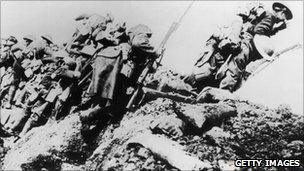World War I football kicked across Somme by Surrey men
- Published
ww1sommefoo.jpg)
This football was kicked across no man's land during the Battle of the Somme by soldiers from the East Surrey Regiment
It was perhaps one of the most dangerous kickabouts in football history.
On 1 July 1916 a company of soldiers from the East Surrey Regiment punted footballs across the shell-scarred landscape of the Somme's no man's land.
Before going over the top they were told the German lines would be obliterated by eight days of shelling.
Instead, they found an army largely intact, waiting with their machine guns.
What followed was one the deadliest days for the British Army with 20,000 men killed.
But the Surreys, who were in the first wave of the attack during the Battle of the Somme, did make it across, taking with them the two leather footballs.

In the first day of the battle 20,000 British soldiers were killed attacking the German trenches
It was the idea of Captain Wilfred "Billie" Nevill, a company commander in the regiment who wanted to give his men something to take their minds off the slaughter.
One of the surviving footballs is on display at the Queen's Royal Surrey Regimental Museum and is featured in a BBC-inspired project, A History of Surrey in 50 Objects, which is taking place across the county this month.
Ian Chatfield, curator at the museum, in Clandon Park, near Guildford, said the generals had told the men that "nothing would be alive not even a rat" after the shelling.
However, the men in the frontline trenches knew differently.
"Captain Nevill had been out on night patrols through no man's land and had seen what the artillery barrage had done or not done," said Mr Chatfield.
"The men were ordered not to stop for friends, to keep going.
"So Nevill felt the footballs would take their minds off what was going on around them."
What happened next has gone down in legend.
An observer from the artillery, who was based at a forward post at the time, witnessed Nevill's attack.
Mr Chatfield said: "The observer saw a man who he thought was an officer get out of the trench and give the ball a good kick towards the German lines.
"That appeared to be the signal for the advance, with the other men kicking the ball as they went."
Nevill's men made it to the other side before being stopped by the German barbed wire, which had not been destroyed by the artillery barrage.
"Captain Neville was shot and killed encouraging the troops to continue the advance over the wire and into the German trenches," said Mr Chatfield.
Fighting footballers
But Nevill's men were successful and the following day the ball was retrieved off the wire and taken back to Surrey.
The story shows the connection between football and World War I.
During the Christmas truce of 1914, a game of football was played between British and German troops in no man's land.
Footballers were also on the frontline - a battalion was formed in the Middlesex Regiment from players eager to fight for their country.
And during the Battle of the Somme a former Newcastle United player, Donald Bell, won a Victoria Cross, the highest award for bravery in the British armed forces.
"These were young men, not more than boys," said Mr Chatfield. "Playing football was a natural thing to keep them busy."
- Published23 March 2011